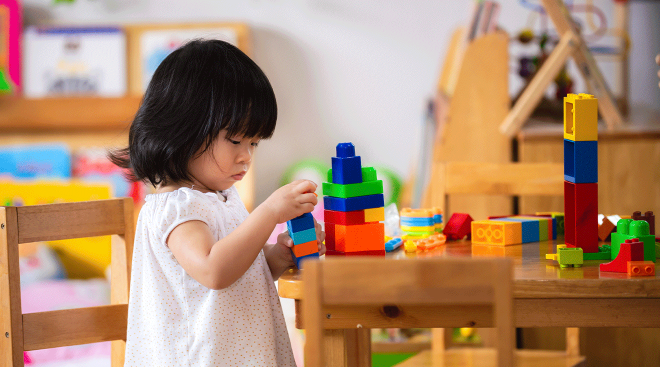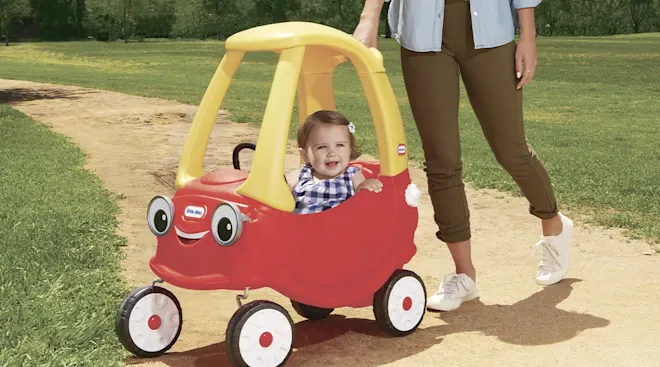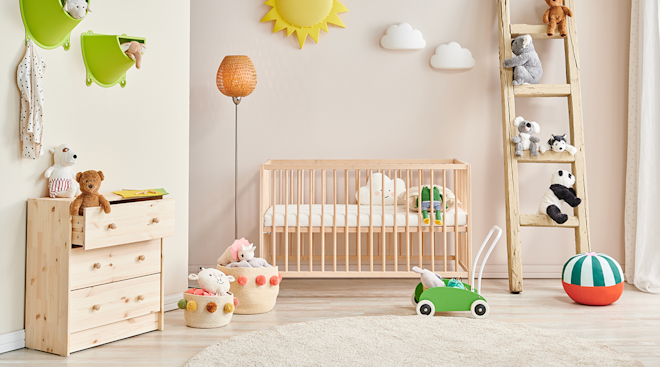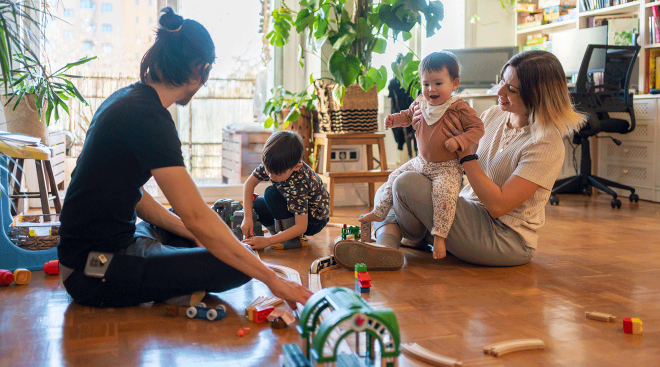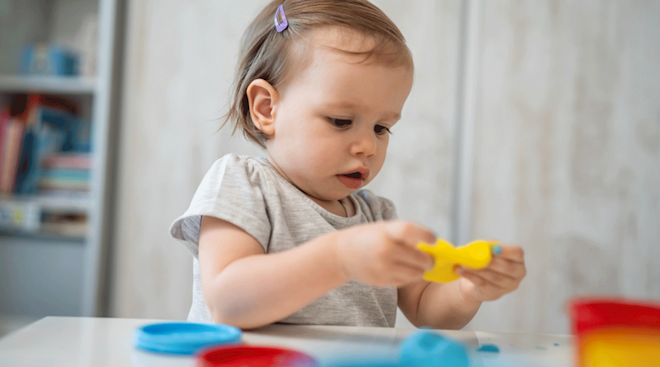How to Survive Holiday Toddler Meltdowns
Celebratory meals, crazy travel plans and, of course, piles of presents—the holiday season can be a time of excess. Unfortunately, many parents find that their young children’s temper tantrums also kick into overdrive during this holly-jolly part of the year. There’s a lot happening, and just like you feel the pressure, your toddler does too. And while you have ways to manage the harried hecticness of it all (shopping, end-of-year work projects, squeezing in all the traditions!), your little one may have a harder time keeping up and coping. Naturally, this can lead to crying, fits and fury. Fortunately, there are steps you can take to help your kiddo feel more balanced despite the inevitable holiday hustle and bustle. Ready to make the season more cheerful and less tearful? Read on for expert tips on how to manage temper tantrums and meltdowns—and maybe even prevent them from happening in the first place.
There are a few related reasons that explain why toddlers tend to lose it more frequently as the year winds down. For starters, the days are probably lacking the usual structure—daycare might be closed, they may be eating lots of new (and sugary) foods, they may be off-schedule due to travel or holiday events and they might not even be sleeping in their own home.
What’s more, they don’t yet have the coping skills to deal with all the changes they’re facing. “One thing toddlers are very bad at is emotional regulation—being able to manage and control emotional reactions to situations—and the holiday season can be the ultimate test of self-regulation, since kids are off their schedules, they are traveling to new places, there are different routines and parents may be bending the usual food rules in favor of treats,” says Megan Carolan, vice president of research at the Institute for Child Success in Greenville, South Carolina.
It can be upsetting to witness your child having a tantrum, and it can feel even more fraught when it happens during what’s supposed to be a special holiday event. Here are some tried-and-tested coping strategies to try.
Hold tightly to your own serenity
Your response to your child’s behavior is contagious. “It’s important to remain as calm as possible, and while this can be difficult, the more upset you become, the more upset the child will become, because they’ll pick up on your mood and energy,” says Anne Inwood, MSW, an early intervention clinical social worker and founder of Successful Families Together in Chicago. Take a deep breath and lead by example.
Separate yourselves
The beauty of the toddler period is that kids this age can still be comforted by a simple distraction. If the situation allows, try to find some new scenery, even if that just means bringing your child into the guest bedroom at Grandma’s house or going for a walk outside a bustling restaurant. “Removing them even temporarily will help them calm down and relax,” says Inwood.
Engage them solo
Once you’re out of the escalating environment, use whatever comforting measures you think work best for your child, suggests Inwood. Try giving them a tight hug, pulling out their favorite stuffed animal or even just offering them a sip of water. John Maypole, MD, a pediatrician at the Boston Medical Center, suggests prolonging this alone time if it seems like that’s what your child needs. “If necessary, delay a return to the bigger group and make some intimate fun—read a book together, sing a song or pretend to cast a spell and send those bad feelings packing,” he says.
Talk it out—maybe
Depending on your little one’s age and personality, you may want to discuss what happened once they’ve calmed down. “If the child is willing to talk about it, let them know that meltdowns happen and it’s okay when they do,” says Maypole. All feelings are okay; some behaviors are not.
Toddler temper tantrums are developmentally appropriate, so you can’t totally ensure that they won’t happen. But there are a few things you can do to set yourself up for a more peaceful holiday season.
Aim for routine each day
Consistency is key. “Toddlers do well with routine and thrive on it,” says Inwood. So whether you’re traveling or having a staycation, make sure your child is sleeping well, eating at their usual intervals (and ideally not an excessive amount of sweets) and getting plenty of physical activity. This might mean splurging on a hotel room where your child might get more shut-eye, instead of bunking at a relative’s house that’s already packed with guests. You may also need to feed your child a simple, kid-friendly lunch at noon, way before Aunt Edna’s elaborate Sunday roast is ready, or take them to run around outside after breakfast to burn off some energy, rather than staying in pajamas all morning.
Pack smartly for trips
Savvy parents know that their suitcase needs to hold more than just diapers, clothing and their child’s favorite teddy bear (though all of those are important too). Maypole suggests having healthy, portable snacks like energy bars or cut-up fruit on hand to help keep your child full on busy days, as well as a portable white-noise machine or app for bedtime and some favorite books (new ones can be great distractions too). Staring down a long plane ride? A small cache of portable, “new-to-them” travel toys is always a good bet, and you don’t have to spend too much—try getting hand-me-downs or even temporarily trading with another parent so each child has some novel items for the trip. Don’t forget a fresh pack of crayons and a pad of construction paper—they don’t take up much room, and drawing is something family members of all ages can do with your toddler.
Set up a calm space
It’s an exciting, event-filled time. You may not be able to convince your child to nap, but if you’re visiting friends or family, it can be helpful to have a dedicated area for downtime. A quiet corner of a guest bedroom or office will do. “Alone time can be as important as naptime, and giving children a chance to be on their own or with siblings may allow them to recharge and be ready to reenter the holiday fray,” says Maypole. If you’re the one hosting, make sure your child has time and space to play or enjoy the treat of some screen time, rather than forcing them to always be “on” for your guests.
Discuss your plans in advance
Whether you’re going away or just planning a busy week of holiday-themed activities, you’ll want to talk to your child about what you have coming up—even if they’re very young. This will get them excited and help prepare them for any routine changes ahead. “Parents should talk with their children in a way that’s right for their age to give them a sense of where they’re going, who is coming and what will happen,” says Maypole. “Books are a wonderful way to help convey these messages to children in a manner they’ll understand.” (The book Time for a Trip, by Phillis Gershator, is a nice choice if you’re visiting family.) Another option? Make a physical photo album filled with pictures of relatives that your child can peruse before your trip.
Communicating clearly is especially important if your child is showing early signs of a neurodevelopmental disorder such as attention-deficit/hyperactivity disorder (ADHD) or seems prone to anxiety. “These children can have a harder time navigating changes to their schedule, so something as simple as helping [them] plan and visualize the week ahead will set them up for success,” says Jason Khan, PhD, a developmental psychologist and research associate at Harvard Medical School and the chief science officer and co-founder of the children’s digital platform Mightier.
Keep expectations low
Whether it’s the first trip to visit Santa or a stop at your parents’ annual New Year’s Day open house, try not to get too attached to how you think a certain event will go. Parents of toddlers have to be flexible and prepare for inevitable changes in their child’s mood. This might even mean mastering the art of the speedy, well-timed exit. "Caregivers can do themselves a favor by expecting a meltdown—recognizing that with so much stimulation, it may be a matter of ‘when’ and not ‘if,’” says Carolan.
The holidays can be full of joy—especially when you have an eager toddler to introduce new family traditions to. Make the most of these merry moments, and soak it all in. But remember, nonstop activity and a go-go-go pace can be overstimulating for anyone, especially young kids. Keep things in perspective and know that meltdowns and tantrums are par for the course. Whatever happens, your patience, presence and love will help make the season special and memorable.
Please note: The Bump and the materials and information it contains are not intended to, and do not constitute, medical or other health advice or diagnosis and should not be used as such. You should always consult with a qualified physician or health professional about your specific circumstances.
Plus, more from The Bump:
Megan Carolan is the vice president of research at the Institute for Child Success, a nonprofit research and policy organization focused on the well-being of children. Her areas of expertise include center-based care and education, pediatric healthcare policy and prenatal support policies. She holds a master of public policy from Rutgers University in New Jersey.
Anne Inwood, MSW, is an early intervention clinical social worker and the founder of Successful Families Together, a Chicago-based organization that helps families create successful routines by providing parents with mental health services as well as support, education and resources.
Jason Kahn, PhD, is a developmental psychologist and the chief science officer and co-founder of Mightier, a digital platform that helps children learn coping skills through play. He holds appointments at Boston Children’s Hospital and Harvard Medical School, where he creates and researches new technology addressing acute problems in pediatric mental health.
John Maypole, MD, is a clinical associate professor of pediatrics at Boston University School of Medicine and the department vice chair and director of the comprehensive care program at Boston Medical Center. He is also a member of the Educational Advisory Board of the Goddard School, a national network of early childhood education centers. He received his medical degree from the Yale University School of Medicine.
Learn how we ensure the accuracy of our content through our editorial and medical review process.
Navigate forward to interact with the calendar and select a date. Press the question mark key to get the keyboard shortcuts for changing dates.


































